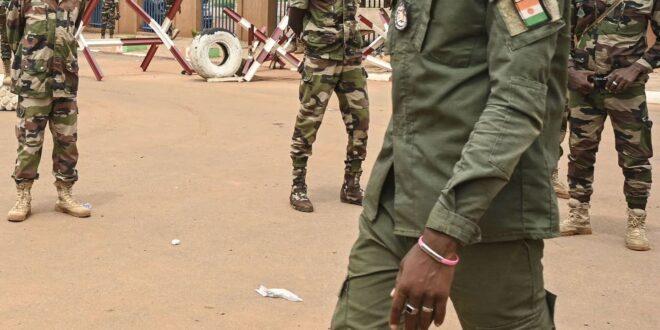The United States lavished military aid on Niger and nearby countries. But the ties we built have turned out to be tenuous.
Ever since the US Army established Africa Command in 2007, the vast West African country of Niger has been the apple of our eye. Working with a pro-Western government there, we have poured in large amounts of aid. Much has been military. More than 1,000 American soldiers are in Niger. Many are deployed at a drone base that we built for $110 million.
Suddenly it is all disappearing. After a military coup on July 26, Niger is now anti-West and apparently pro-Russia. Desperate to ensure the continuation of the US presence, President Biden dispatched Undersecretary of State Victoria Nuland to meet with Niger’s new leaders. She got nowhere in talks that she called “quite difficult.” It is a stunning reversal — and another example of global power shifts in Africa, Asia, and Latin America.
“Niger was the bastion for the United States and its Western allies in the volatile central Sahel region of Africa,” J. Peter Pham, a former US envoy to the region, wrote after the coup. “Years of patient effort and billions of dollars of investment to support what was thought to be an anchor for regional security and stability seems to have been lost in the blink of an eye.”
The coup in Niger is the latest in a succession of African coups that have, in the space of just three years, toppled four governments that were friendly with the United States and France, the former colonial power. Niger joins Mali, Burkina Faso, and Guinea to create a new band of nations across Africa that are rebelling against their longtime Western masters — or partners, depending on your perspective.
President Ibrahim Traore of Burkina Faso, who seized power last September and is the world’s youngest head of state at 34, epitomizes the defiance that shapes this new crop of leaders.
“A slave who cannot assume his own revolt does not deserve to be pitied,” Traore said at last month’s summit of African leaders in Russia. “We African heads of state must stop behaving like puppets who dance every time the imperialists pull the strings.”
All four of these new governments take a tone that that is not just anti-West but remarkably pro-Russia. Their motivation is mainly strategic, since there is no natural or historical tie. The first Russian aid to Africa was a 1960 shipment of snowplows to Guinea, where it has never snowed. In recent decades, however, Russia has focused more intensely on Africa. It seeks resources and geopolitical allies. In Niger it may find both.
Russia can provide unstable African regimes with soldiers to defend their power. It also has popular appeal, because Russia never colonized Africa or subverted Black African governments as the United States and European powers did.
Days after the Niger coup, Yevgeny Prigozhin, commander of the Wagner Group, a private Russian military force that is deployed in several African countries, cheered the new government and offered help. “What happened in Niger,” he said, “is nothing other than the struggle of the people of Niger with their colonizers.”
Russia clearly sees it as more than that. If the coup regime in Niger survives, Russia could gain access to the US drone base and other former American assets.
“What happened and what continues to happen in Niger was not instigated by Russia or by Wagner, but . . . they tried to take advantage of it,” Secretary of State Antony Blinken said after the coup. “Every single place that this Wagner Group has gone, death, destruction, and exploitation have followed.”
Pro-Western governments in the surrounding region have threatened to send an army into Niger to reverse the coup. Their prospects are dim. Many of their own citizens sympathize with the new regime in Niger. Foreign intervention would reinforce the narrative that holds outside powers responsible for Niger’s troubles. Some fear that intervention could spark an African proxy war between US-backed and Russian-backed alliances, opening a new front in the US-Russia showdown now unfolding in Europe. That’s how world wars start.
Since the creation of Africa Command, US forces have been launching drone attacks across the region and training a variety of local military units. This approach has done little to stem violence fomented by radical Islamic militias. Some in Africa blame the violence partly on the United States. Jihadist fighters have used weapons that were looted from arsenals in neighboring Libya after the US-led attack on that country in 2011.
Niger’s new government has closed the country’s airspace, effectively ending US drone operations. It has halted exports of uranium to France. Soon it may follow Mali and Burkina Faso by expelling French troops. It could also demand radical changes to a contract for a $13 billion pipeline that is supposed to carry natural gas from neighboring Nigeria toward Europe.
For more than a decade, the United States has lavished military aid on Niger and nearby countries. We have pushed their governments to fight radical militias. Yet according to a 2017 United Nations survey, most Africans who join those militias do so in response to state violence. The militarization of US policy toward Africa is backfiring. Niger’s flip toward Russia is the most recent result. It won’t be the last.
 Eurasia Press & News
Eurasia Press & News




